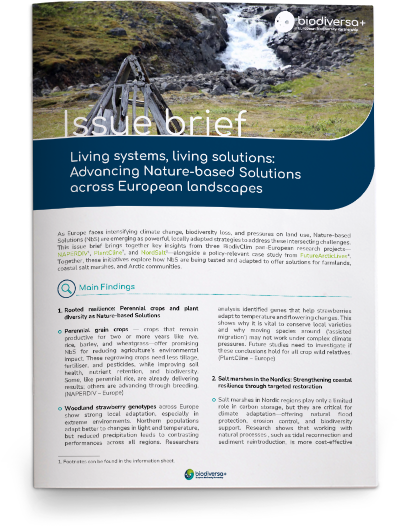Download the issue brief
Issue brief: “Living systems, living solutions: Advancing Nature-based Solutions across European landscapes”
As Europe faces intensifying climate change, biodiversity loss, and pressures on land use, Nature-based Solutions (NbS) are emerging as powerful, locally adapted strategies to address these intersecting challenges. But they are often seen too narrowly as conservation or carbon storage measures. The BiodivClim projects demonstrate their true potential as holistic, place-based strategies that combine ecological restoration, social equity, and long-term resilience.
This issue brief brings together insights from four research projects:
- NAPERDIV, testing perennial crops to reduce agriculture’s footprint
- PlantCline, studying plant genetic diversity and climate adaptation
- NordSalt, restoring salt marshes for coastal resilience
- FutureArcticLives, exploring NbS in Arctic communities
Together, they show how NbS can help protect Europe’s farmland, coastlines, and remote landscapes, while delivering benefits for both people and nature. This underlines the importance of investing in approaches that draw on local knowledge and participation, support biodiversity and human well-being, and are integrated into long-term, systemic planning.
Main findings
- Perennial crops and plant diversity contribute to resilience in agriculture. Perennial grain crops, such as intermediate wheatgrass and perennial rice, regrow for several years and can reduce agriculture’s environmental impact by improving soil health, lowering the need for tillage and fertilisers, and supporting biodiversity. At the same time, conserving the genetic diversity of native plants, such as the woodland strawberry, is important for developing crops that can cope with climate change. This highlights the value of protecting local varieties rather than relying solely on approaches like assisted migration.
- Targeted restoration strengthens coastal resilience. Salt marshes may play a limited role in carbon storage in Northern Europe, but they are invaluable for flood protection, erosion control, and biodiversity support. Research shows that working with natural processes, such as tidal reconnection and sediment reintroduction, is more effective than intensive planting. Yet recovery takes decades, calling for long-term planning and harmonised EU monitoring frameworks.
- The success of NbS depends on people as much as ecosystems. Farmer-led innovation networks and the integration of Indigenous and local knowledge, from pioneering perennial wheatgrass trials in France to traditional reindeer herding in the Arctic, are essential for ensuring that NbS are effective, trusted, and rooted in local realities.
